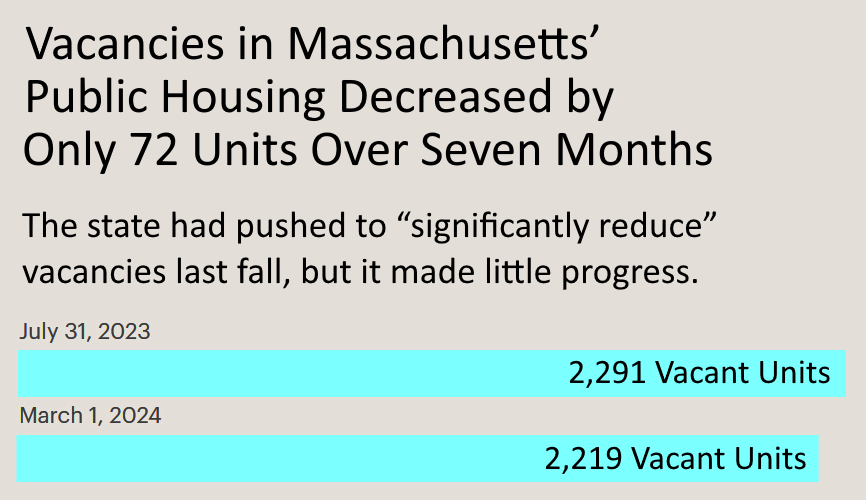This story was originally published by ProPublica.
Every night, Graciella Carter puts her 5-year-old son to bed with the same routine. She tucks Oscar under some blankets, kisses and hugs him, and stays with him until he drifts off to sleep, no matter how long it takes.
But nothing else is routine. They stay in a different place almost every night. The bed may be a sofa in a friend’s or relative’s living room anywhere in western Massachusetts. Carter usually has to sleep sitting up, at the end of the couch or on a nearby chair, leaning on her fist like a pillow.
Carter and Oscar have been couch surfing since being evicted from their Holyoke apartment in October. She said she fell behind on the rent because she’d been injured in a car accident and couldn’t work for several months. Oscar had to give away his beloved dog, a poodle-Chihuahua mix named Luna. When friends didn’t have room for both Carter and Oscar, she would sit by his side until he fell asleep and then spend the night in her car — until it was repossessed a month ago. Now she gets rides from friends or takes buses, hauling around a pair of laundry bags with their clothes and other necessities.
“It’s hard,” she said recently while playing with Oscar in a small park in downtown Northampton, 20 miles north of Springfield. “It’s just bouncing around.”

The 28-year-old, a high school graduate who has worked off and on as a certified nursing assistant, has been waiting for a state-subsidized apartment for nearly five years, since Oscar was a few months old. She has applied for state-funded housing in 11 cities and towns without getting a single placement, even though some of those communities have vacant family units.
State-subsidized public housing remain vacant
To the disappointment of the Carters and other families desperate for refuge from the winter cold, the state failed to achieve its goal, proclaimed last September, to “significantly reduce” vacancies in state-subsidized public housing by Jan. 1. The “90-day push” followed an investigation by WBUR and ProPublica, which revealed that almost 2,300 state-funded units were vacant, despite a waitlist of more than 180,000 people. The findings came as the number of homeless families increased sharply, prompting Gov. Maura Healey to declare a state of emergency, which remains in effect.
Yet the 90-day initiative barely made a dent in the vacancy totals. According to the latest data available, the number of vacancies has dropped by only 72 since July. As of March 1, the figure stood at 2,219, with most of the decline occurring in the past two months after WBUR asked why the state hadn’t made more progress. More than three-quarters of the vacant units have been unoccupied for at least 60 days, the deadline that the state gives local authorities to fill a unit. Apartments that remain empty beyond that time limit need a state waiver or the local authority may face fines.

Source: The Massachusetts Executive Office of Housing and Livable Communities
Problems contributing to vacancies remain unsolved
The state also has not fixed key problems that contribute to vacancies, WBUR and ProPublica found. It still doesn’t screen applicants for eligibility when they first apply for housing, and it allows people to sign up in as many as 230 places, including towns too far away for them to realistically relocate to. Almost 13,300 candidates for priority status, which is largely reserved for people in dire need of housing due to situations like fires, domestic violence or a condo conversion, are still waiting for a vendor hired by the state to determine if they are eligible and potentially bump them up the list.
In most states, low-income residents seeking affordable apartments rely on federal public housing or vouchers for private housing. Massachusetts has those options, but it’s one of four states — the others are New York, Connecticut and Hawaii — that also offer state-funded public housing. The state’s 41,500 subsidized apartments are in high demand because Massachusetts has some of the highest housing prices in the country.
The continuing abundance of vacancies “is a failure. It’s a failure for the state. It’s a failure for the system. It’s a failure for the housing authority.”
Maureen Cayer, director
Agawam housing authority
Until 2019, local housing agencies in Massachusetts were responsible for maintaining their own waitlists for the subsidized units. That year, the state created a central list with the aim of making it easier for people to find public housing. Instead, the system has become a bureaucratic quagmire.
The waitlist “is not going to get fixed with iterative steps,” said John LaBella, president of HousingWorks, a Boston company that helps people find affordable housing. “It needs a fundamental redesign.”
All the communities where Carter has applied for state-subsidized apartments are in western Massachusetts, and she would be glad to live in any of them. Agawam, a Springfield suburb, has a pair of three-bedroom units that have been vacant since 2021, along with seven empty two-bedrooms that would be suitable for the Carters. But the waitlist functions so ineffectively that the Carters and many other families have yet to receive offers.
When applicants reach the top of the list, Agawam’s housing authority notifies them, then spends hours verifying their information and reviewing their criminal backgrounds, income and references. Ultimately, most of them don’t respond, don’t qualify, or decline to move to Agawam. On average, Agawam vets hundreds of applicants to fill one vacancy, said Maureen Cayer, director of the housing authority there.
The continuing abundance of vacancies “is a failure,” Cayer said. “It’s a failure for the state. It’s a failure for the system. It’s a failure for the housing authority.”
Kevin Sbardella, director of the Fall River housing authority, similarly blamed the state’s centralized waitlist for the nearly two dozen empty units there. He said he wishes agencies could go back to using their own lists. “If I could just go local, I’d fill my vacancies up in a week,” he said.
After WBUR asked in February about the failure to fill more vacancies, state officials made a new set of promises to local housing directors. Ben Stone, director of the state division of public housing and rental assistance, pledged to track vacancies better and provide extra funding to help agencies reduce high vacancy rates. In an email to local housing directors, Stone said the state aims to cut the vacancy rate almost in half, to 3%. That would mean reducing the number of vacant apartments by nearly 1,000.
To receive priority, applicants must show they lost their housing through no fault of their own.
State housing officials didn’t set a deadline to achieve the 3% mark. They told WBUR that it is a “long-term” objective, and that the medium-term goal is getting under 2,000 vacant units. They said they have been tracking the number of vacancies since 2016, and 2023 was the first year that it declined. “I think we made a little bit of headway,” Housing Secretary Ed Augustus said in an interview.
Augustus said he was surprised to hear that local housing officials were complaining about the waitlist. He said they have told him the system has been working much better since the state hired an outside vendor last year to help screen applicants who requested priority to move up the waitlist.
“They’ve all told me they’ve seen improvements,” Augustus said. “Not perfection. Not every bug has been taken out of the system, but marked improvements.”
Applicants reviewed and approved but still waiting
The contractor handling the priority review has screened out far more applicants than it has approved. As part of a three-year, $3.3 million contract, Archipelago Strategies Group, a Boston marketing firm, is working its way through a backlog of 45,000 requests to move up the waitlist. So far, it has approved 640 completed applications and denied another 1,435, according to state housing officials. They said the firm has discarded more than 30,000 other applicants because they withdrew, did not respond to requests for more information, or were deceased or otherwise no longer eligible. Most of the applicants approved by Archipelago for priority are still waiting for housing offers, according to the state.
“I have a 5-year-old, it’s winter, how does that not make someone a priority?”
Graciella Carter, homeless mother
Archipelago has sifted through more than two-thirds of the priority requests, and it is “helping the most vulnerable applicants move forward as quickly and fairly as possible,” said Josiane Martinez, the company’s chief executive officer. “Our centralized screening is saving housing authorities thousands of screening hours, which they can now use to finalize housing placements.”
One priority applicant Archipelago rejected was Carter, the homeless mother in western Massachusetts. One reason she gave for seeking priority was that her injuries made it difficult for her to climb the stairs to the second-floor apartment where she and Oscar had been living. “Your documents show that the Primary Residence was not the impediment to your health,” Archipelago wrote her on Oct. 12. Once she was evicted, she remained ineligible because nonpayment of rent is typically considered the tenant’s fault. To receive priority, applicants must show they lost their housing through no fault of their own.
“I have a 5-year-old, it’s winter, how does that not make someone a priority?” Carter said. “I don’t care about anything other than finding somewhere to stay.”
Building repairs and renovations contribute to delays — sometimes for years
Waitlist woes aren’t the only reason for vacancies. More than 100 apartments have been repurposed for uses such as offices, storage or laundry. Hundreds more need major renovation. Augustus said he’s asked his team to make sure there are good reasons for taking such units offline.
Last fall, Healey proposed a bond bill that includes $1.6 billion in funding for capital expenditures in public housing, more than double the previous allocation. The funds would help renovate hundreds of uninhabitable or rundown apartments. But the Legislature has yet to approve it. Augustus estimated that the state has “over $1 billion worth of requests in the pipeline” for public and private development from local housing authorities.
 One stalled project is in Fall River, where the state approved an $8 million grant in 2020 to rehab 40 apartments, about half of which are vacant. But the state has yet to sign off on final plans, so the authority can’t seek bids or start construction. One unit has been empty for almost eight years.
One stalled project is in Fall River, where the state approved an $8 million grant in 2020 to rehab 40 apartments, about half of which are vacant. But the state has yet to sign off on final plans, so the authority can’t seek bids or start construction. One unit has been empty for almost eight years.
“That’s been just moving at a snail’s pace,” said Sbardella, who runs the Fall River housing authority.
A spokesperson for the state housing agency said it agreed to reimburse local housing authorities for $1.5 million in minor repairs and staff overtime during the state’s push to fill vacancies last fall. But some local housing directors said the 90-day window for funding was too short for them to learn about the program, line up workers and win approval from their boards.
“I need a solid four to six months at least,” said Paula Mountain, executive director of the housing authority in Wenham, 25 miles north of Boston. She was only able to take advantage of the offer for two months, she said.
Cayer, in Agawam, said she didn’t tap the money because her state liaison couldn’t explain where it was coming from and what strings, if any, were attached. Stone told housing directors in February that the state plans to extend portions of the aid beyond 90 days.
Meanwhile, Carter and her son are still waiting and hoping to find a place to live. Although Carter has largely recovered from her car accident, she said she had to quit a recent job as a medical assistant because she didn’t have reliable child care or a home to invite a sitter to. She’s separated from Oscar’s father, who is not currently providing any financial help, she said.
In the Northampton park, she watched Oscar leap over a stump, then chased him across the wet grass and spun him around on a carousel.
“You want to spin?” she asked him. “Are you sure? OK, tell me when you have a good grip. You ready?”
Oscar can’t ride his bike or play with his toys at the park; his mother had to put them in storage. Instead, after playing with her and riding the carousel, he entertains himself by collecting sticks.
***
Todd Wallack is a correspondent on WBUR’s investigative team and was previously the deputy managing editor in WBUR’s newsroom and oversaw a team of reporters covering politics, criminal justice, and general news. Prior to WBUR, Wallack spent 14 years as a reporter at the Boston Globe, including eight as an investigative and data reporter on the Globe’s Spotlight Team. While at the Globe, he worked on five projects that were finalists for the Pulitzer Prize. Wallack has also worked at several other newspapers, including the San Francisco Chronicle, Boston Herald, and the Dayton (Ohio) Daily News.
ProPublica is a Pulitzer Prize-winning investigative newsroom. Sign up for The Big Story newsletter to receive stories like this one in your inbox.




























